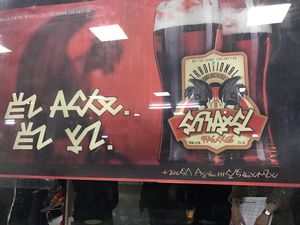El
Bodzvokhan
| Bodzvokhan Phrasebook | |
|---|---|
| This entry is part of the phrasebook project, which presents criteria for inclusion based on utility, simplicity and commonality. For other Bodzvokhan entries on this topic, see Basic.
| |
Etymology 1
Pronunciation
- Rhymes: -ɛl
Orthographic Form
el
Cyrillic Orthographic Form
эл
Adjective
el
- what, which
Inflection
| Singular | Plural | |
|---|---|---|
| Nominative | el | elef |
| Genitive | elan | elem |
Pronoun
el
- what
Inflection
| Singular | Plural | |
|---|---|---|
| Nominative | el | elef |
| Genitive | elan | elem |
Etymology 2

Pronunciation
- Rhymes: -ɛl
Orthographic Form
el
Cyrillic Orthographic Form
эл/эль
Noun
el
- ale
Inflection
| Singular | Plural | |
|---|---|---|
| Nominative | el | elyef |
| Genitive | elyan | elyem |
Creation and Usage Notes
| This was used in my absolute favorite graphic (see above) in the film—perhaps one of my favorite graphics ever. One of the best uses of a writing system I created I have ever seen. This art department absolutely got the fact that I created a writing system, and they could create different font faces for it. Extraordinary work.
-David J. Peterson 15:28, 5 January 2020 (PST) |
Veda
| Veda Phrasebook | |
|---|---|
| This entry is part of the phrasebook project, which presents criteria for inclusion based on utility, simplicity and commonality. For other Veda entries on this topic, see Basic.
| |
Etymology
From Proto-Veda *ʔjl.
Pronunciation
Orthographic Form
el
Noun
el
- tooth
Yulish
| Yulish Phrasebook | |
|---|---|
| This entry is part of the phrasebook project, which presents criteria for inclusion based on utility, simplicity and commonality. For other Yulish entries on this topic, see Basic.
| |
Etymology
| From an invisible proto-language. |
|---|
| The etymology of this word comes from an invisible proto-language. If you're confident you know the etymology, feel free to add it, but reader beware should the etymology be added by someone other than the creator of the language! |
Pronunciation
Noun
el (indefinite plain/vocative singular)
- (mythology) elf (as in one of Santa's elves, who are real in this universe)
- individual, person
Inflection
| Indefinite | Definite | |||
|---|---|---|---|---|
| Singular | Plural | Singular | Plural | |
| Plain | el | elp | elva | |
| Objective | elvin | elvim | elvinna | elvimma |
| Vocative | el | elvish | elviship | |
| Possessed forms of el | ||
|---|---|---|
| Singular | Plural | |
| First Person | elvi | elvim |
| Second Person | elvla | elffa |
| Third Person | elvish | elvir |
Translations
| Sense: individual [edit] |
|---|
|
Creation and Usage Notes
| I specifically created the nominal inflections of Yulish in order to support the irregular voicing of the "f" from English "elf" to "elves". The idea was the Yulish word would have inspired the English word. Essentially, the older root would have been *elv, and the final [v] would be dropped in word-final position. I apparently used elp as an indefinite plural, something I don't necessarily agree with anymore, but I used it in a line of background dialogue, so elp it remains.
-David J. Peterson 16:25, 15 October 2023 (PDT) |
Categories:
- Bodzvokhan phrasebook
- Bodzvokhan phrasebook/Basic
- Bodzvokhan terms inherited from Sungdin
- Bodzvokhan terms derived from Sungdin
- Bodzvokhan terms with IPA pronunciation
- Rhymes:Bodzvokhan/ɛl
- Bodzvokhan lemmas
- Bodzvokhan adjectives
- Bodzvokhan pronouns
- Bodz:Swadesh list
- Bodzvokhan terms borrowed from Russian
- Bodzvokhan terms derived from Russian
- Bodzvokhan nouns
- Bodzvokhan terms with creation and usage notes
- Veda phrasebook
- Veda phrasebook/Basic
- Veda terms inherited from Proto-Veda
- Veda terms derived from Proto-Veda
- Veda terms with IPA pronunciation
- Veda lemmas
- Veda nouns
- Veda:Animal body parts
- Veda:Body parts
- Veda:Swadesh list
- Yulish phrasebook
- Yulish phrasebook/Basic
- Yulish terms with IPA pronunciation
- Yulish lemmas
- Yulish nouns
- Henl:Mythology
- Sense:Individual
- Yulish terms with creation and usage notes
- Yuli:People
- Yuli:Mythological creatures
- Yuli:Swadesh list